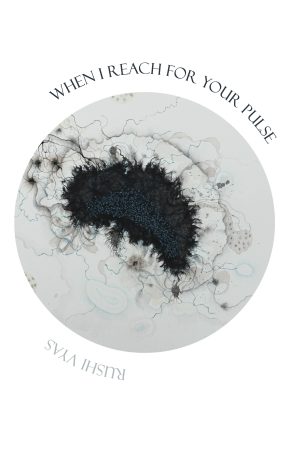
paper • 124 pages • 17.95
ISBN: 978-1-954245-54-9
eISBN: 978-1-954245-55-6
March 2023 • Poetry
Longlisted for the Ockham New Zealand Book Award in Poetry
In this electrifying debut, lyric works to untangle slippery personal and political histories in the wake of a parent’s suicide. “When my father finally / died,” Vyas writes, “we […] burned, / like an effigy, the voiceless body.” Grief returns us to elemental silence, where “the wind is a muted vowel in the brush of pine / branches” across American landscapes. These poems extend formal experimentation, caesurae, and enjambment to reach into the emptiness and fractures that remain. This language listens as much as it sings, asking: can we recover from the muting effects of British colonialism, American imperialism, patriarchy, and caste hierarchies? Which cultural legacies do we release in order to heal? Which do we keep alive, and which keep us alive? A monument to yesterday and a missive to tomorrow, When I Reach for Your Pulse reminds us of both the burden and the promise of inheritance. “[T]he wail outlasts / the dream,” but time falls like water and so “the stream survives its source.”
I waited all my life for my father
to die and when he finally did I heard
the whip of voices caged within
his skull. In the neighborhood, maple
branches sprawled into each other, each
trunk an asthmatic wheeze summiting
the snake line, each limb heaving
into the next. A pattern ripples through
the absence of whom we scatter. I heard
my own pulse shelled by inheritance, felt
the stubborn flesh of a neck that snapped
its own beat. Outside, when people celebrate
the terrorist’s death in the streets, I do not
leave my house. When my father finally
died, we cut him from the ceiling, fed him
sweets, dipped him in oil, and burned,
like an effigy, the voiceless body
In his debut collection Rushi Vyas asks, what is left of the family, of the self, of the heart, after a father’s suicide? The hauntings of this tragedy ripple throughout this deftly constructed collection and show how this trauma lives in the body, where the reaching for the pulse is multidirectional, opening up the possibilities of how we live inside one another. These poems are an antidote to the notion of log kya kahenge? What will people say? that keeps families spiraling in their own cycles of grief instead of tearing down the load bearing beams of the house of sadness. Vyas shows us in gem-cut lines and poetic turns, how poetry fills that space of grieving and transforms these etching-like traumas into memories for examination. As you read, pay close attention to sound and sense and the intimacies to learn how to hold your fragile selves. This is a guidebook for survival: how to endure when violence attempts to swallow you whole. These are poems I now keep on my prayer shelf.
Rushi Vyas’s staggering first collection is an effigy formed by that brightness we know will supplant the day’s dark whether we see it happen or not. This lyric is simultaneously interrogation, mourning, joy. The speaker in these poems searches for direction, some impetus that might occupy the mind against dreams in a layered and multivocal testament to the gravity of witness, to the perpetual happening of a moment that reverberates so profoundly it cannot end, a temporal ripple that, steeped in a sonic resonance where syllables are not yet words or a body mostly nothing … air & bone lined with skin, anchors us to the intersection where I meets Thou meets We. I’m thrilled to be invited into these poems where snow stifles / the certain world and the season of unknowing feels most like an emancipation gifted within this ‘verse, within these ‘verses.
In this unflinching debut, Rushi Vyas intricately untangles personal and familial memories as a lyrical mode of mourning. “I waited all my life for my father to die,” Vyas writes in the opening poem, and we witness the aftermath of a paternal suicide which left shockwaves in its wake. There is no bracing for the impact of a self-inflicted violence that ends a history of domestic violence. Relief, dread, and radical compassion lace these unforgettable accounts. At times fierce and tender, these poems reveal how anti-elegy is essential to the elegiac form.